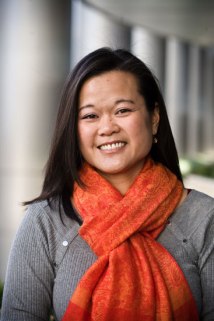By: OiYan Poon
 Smirking when I asked if he had any questions before I turned on my recorder for our interview, Stan responded, “Yes. I can tell by your name and how you talk that you’re probably ‘Chinatown Chinese.’ Am I right?”
Smirking when I asked if he had any questions before I turned on my recorder for our interview, Stan responded, “Yes. I can tell by your name and how you talk that you’re probably ‘Chinatown Chinese.’ Am I right?”
Stunned and curious, I asked, “What do you mean by ‘Chinatown Chinese’?”
Presumably trying to convey that he was superior to me, Stan proceeded. “You know what I mean… you probably have family who work in restaurants and sewing factories… low class immigrants. My generation of Chinese immigrants is different than yours. We’re highly-educated professionals. We don’t need handouts. Your generation of Chinese immigrants gave us a bad reputation in America, relying on government handouts.”
Feeling a rage rise in me, I pushed it away for the sake of my research. Taking a long sip of latte and a deep breath to calm myself, I responded nonchalantly “My mom was a garment factory worker, and most of my family have worked in restaurants… casinos, too. My grandparents lived in Boston Chinatown, so we do identify with Chinatown. Some of my family benefited from public assistance. And, I have a Ph.D. like you. Why are you asking these questions?”
Still smirking, Stan answered: “Just curious.” And with that, we began our interview with my audio recorder on for the remainder of our conversation.
I often return to this exchange with Stan, whenever I’m struggling to understand Chinese American racial politics. Through my research on affirmative action and Asian Americans, I learned that most anti-affirmative action and anti-ethnic data disaggregation campaign leaders were Chinese American, like me. And like me, most long-standing Asian American community organizations were caught off guard by this new wave of conservative Chinese activism in SCA-5, the Peter Liang case, opposing ethnic data disaggregation, and against sanctuary policies.
My own ignorance about conservative Chinese American activism became apparent during another interview I conducted, when a participant explained that his main goal in fighting affirmative action was for Chinese Americans to “become white like the Jews,” and to maintain ethnic identity. He understood that white supremacy created a racial order in the U.S., and that there were material profits in possessing whiteness. Instead of fighting systemic white supremacy, these Chinese Americans want to fortify the racial hierarchy, and climb it to gain property privileges of whiteness. These desires for white supremacy were exemplified by Chinese protests against NYPD Officer Peter Liang’s indictment for fatally shooting Black civilian Akai Gurley. Here, protesters argued that Liang should be treated like the white male police officers let off the hook in murdering unarmed Black people. Upward mobility in the U.S. to them means becoming white and superior in the social order, while still maintaining Chinese ethnic identity.
* * *
In my 36 interviews, everyone shared experiences and acknowledgements of anti-Asian racism as well as other forms of racism. Most (30 of 36) also had poor, misinformed understandings of how affirmative action worked. The commonalities between those Asian American affirmative action supporters and opponents whom I interviewed ended there. The majority of anti-affirmative action interviewees immigrated from the People’s Republic of China (PRC), and arrived in the U.S. after the 1990 Immigration Act increased available visas for educated, professional-class immigrants. Many post-1990 immigrants held significant socio-economic privileges in their sending countries, and those privileges were reproduced in the U.S. Still, these immigrants struggle to understand race and racism. Settling in middle-class communities, working mostly with white colleagues, and socializing with fellow Chinese immigrants, they generally live racially segregated lives with little contact with non-Chinese people of color. Some have adopted toxic ethno-nationalist Chinese social perspectives. While several interviewees shared racist views about Latinx and Black people, some also held negative views about other Asian Americans. One interviewee was convinced his daughter didn’t get into an elite university because, he believed, the school was “admitting unqualified students like my daughter’s Vietnamese friend.”
And then, in 2011 came WeChat — a social media app popular among the Chinese diaspora. WeChat currently has over a billion users. Political organizers have used WeChat to distribute fake news and grow an ethno-nationalist Chinese immigrant movement. WeChat facilitated successful protests in 2013 against Jimmy Kimmel, proving its effectiveness as a tool to organize Chinese immigrants. Conservative Chinese immigrants have since manipulated racial anxiety and bigotry to mobilize Chinese immigrants in alignment with white supremacist agendas.
If the Republicans pass the RAISE Act — which would significantly reduce family reunification, eliminate the diversity lottery, limit refugee resettlement, and increase visas for professional workers — it could result in a slowing of population growth among Asian Americans, but not necessarily for highly-privileged immigrants from countries like China. Left unchallenged, conservative WeChat influencers will continue to mobilize new Chinese immigrants for white supremacy.
* * *
Still, I maintain hope. After completing my interviews in 2016, I attended the United Chinese Americans (UCA) conference to facilitate a workshop on elite admissions and affirmative action. Although most participants were skeptical or even strongly opposed to affirmative action, I led an evidence-based interactive workshop to present the facts. I had no goal of convincing anyone to support affirmative action. I just wanted participants to learn facts. Afterwards, one participant told me: “Before this workshop I was against affirmative action, but I didn’t know what it was. I actually support the policy now.” I was shocked when several others shared the same sentiment with me. I also met Chinese immigrant WeChat influencers committed to social justice, who want to collaborate with other Asian Americans to educate WeChat communities about racism and public policies. Chinese immigrants want information and dialogue.
People like me – children or grandchildren of immigrants – are unlikely to become WeChat influencers. Yet, there remains an active and growing political discourse on WeChat, in which we need to engage. We can partner with WeChat thought leaders like Steven Chen, co-founder of CRW Strategy, better educate ourselves about affirmative action (see: AAAJ-LA; Asian American Civil Rights; racial politics of affirmative action) and ethnic data disaggregation, and work to support and engage in inter-generational dialogues and political education.
Fake news is stoking racial anxieties on WeChat, mobilizing Chinese immigrants through the heart. Advocacy for affirmative action, disaggregated data, and other racial justice causes have been informed by data and logic – the head. We need to reconnect the heart with the head of Chinese America, to effectively fight for transformative racial justice.

OiYan Poon is assistant professor of higher education leadership at Colorado State University. Her research focuses on the racial politics and discourses of college access, affirmative action, and Asian Americans. She is also co-editor of Difficult Subjects: Insights and Strategies for Teaching about Race, Sexuality, and Gender. She is currently working on a book entitled Justice or Just Us?: Asian Americans in the Racial Borderlands of the Affirmative Action Debate.
Write Back, Fight Back(#WriteBackFightBack) is a weekly essay series sponsored by 18MillionRising, Asian Americans Advancing Justice, and Reappropriate. It features emerging Asian American writers on topics of racial and social justice. New essays will appear every Thursday.

